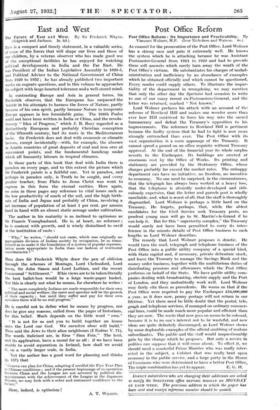East and West
The Future of East aril West. By Sir Frelerick Whyte. (Sidgwick and Jackson. 3s. Eld.) Dirs is a compact and timely statement, in a valuable series,
of some of the -forces that will shape our lives and those of our children,. by a veteran observer who has made good use
of the, exceptional facilities he has enjoyed for watching political developments in India and the Far East. He was President of the Indian Legislative Assembly in 1920-5,
and Political Adviser to the National Government of China from 1929 to 1932 ; he has already published two important works on cognate questions, and in this volume he approaches liis subject with large-hearted tolerance and a well-stored mind.
In contrasting. Europe and Asia in general terms, Sir Frederick observes that the European has surpassed the Asiatic in his attenipts to harness the forces of Nature, partly because of his own spirit, partly because Nature in temperate Europe appears in less formidable guise. The 104th Psalm could not have been written in India or China, and the revolu- tionary " Idea of Progress," which J. B. Bury regarded as a distinctively EurOPean and probably Christian conception of the fifteenth century, had its roots in the Mediterrantan basin. Sir Frederick does not deal with economic or climatic factors, except incidentally—with, for example, the absence in Asiatic countries of great deposits of coal and iron ores at convenient points, and the fundamental handicap under which all humanity labours in tropical climates.
In those parts of this book that deal with India there is paradox on every page, and to this extent the picture which Sir Frederick paints is a faithful one. Yet in paradox, and perhaps in paradox only, is Truth to be sought, and every greater teacher, from Plato to Jesus Christ was wont to express in this form the eternal verities. Here again, we miss in these pages any reference to vital issues such as the low productivity of much of the soil, and the high birth- rate of India and Japan and probably of China, involving a net increase of population of at least 1 per cent. per annum hand in hand with an almost static acreage under cultivation.
The author in his maturity is as inclined to optimism as Sir Francis Younghusband. He is, at heart, no reformer ; he is content with growth, and is wisely disinclined to cavil at the institution of caste : " Why," he writes, " should not caste, which was originally an appropriate division of Indian society by occupation, be so trans- formed as to make it the foundation of a system of popular represen- tation more appropriate to India than our fashion of territorial constituencies I ' Thus does Sir Frederick Whyte draw the pen of oblivion through the schemes of Montagu, Lord Chelmsford, Lord Irwin, Sir John Simon and Lord Lothian, and the recent Communal " Settlement." If his views are to be taken literally the best ballot-box would be a large waste-paper basket. Yet this is clearly not what he means, for elsewhere he writes :
" The more completely Indians are made responsible for their own political and social welfare, the surer and speedier will be the growth of their capacity ; but until they suffer and pay for their own mistakes there will be no real progress."
He is careful not to define what he means by progress, nor does he give any reasons, culled from the pages of historians, for this belief. Much depends on the little word " own."
" It is not for us and you to build together an house unto the Lord our God. We ourselves alone will build." Thus said. the Jews to their alien neighbours (I Esdras V. 71). The words italicized are, in Erse " Sinn Fein." The text, and its application, have a moral for us all : if we have been unable to avoid separatism in Ireland, how shall we avoid it, on a vastly larger scale, in India.
Yet the author has a good word for planning and thinks (p. 157) that " Geneva can plan for China, adapting if needful the Five Year Plan to Chinese conditions ; and if the present beginnings of co-operation between China and the League are not arrested by political dis- appointment with the achievement of the League in the Japanese dispute, we may look with a sober and restrained confidence to the future."
Here, indeed, is optimism I
A. T. WiLsoN.


























 Previous page
Previous page